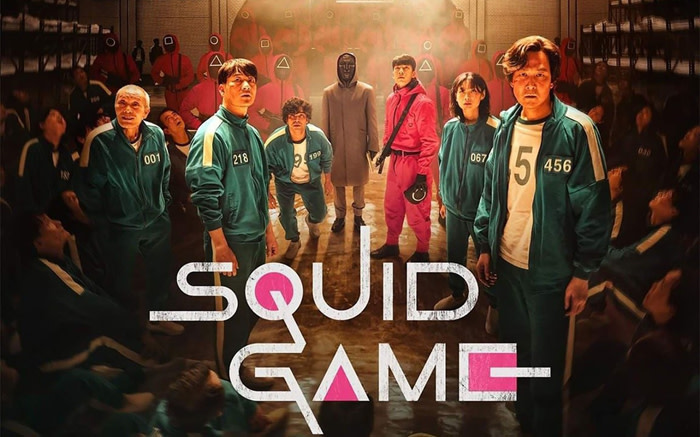‘Squid Game’ characters drawn from director’s life
Many characters in Netflix sensation ‘Squid Game’ are loosely based on its South Korean director’s own life and he believes its theme of economic inequality has resonated with viewers around the world.
A poster for South Korean Netflix series Squid Game. Picture: Supplied
SEOUL – Many characters in Netflix sensation Squid Game are loosely based on its South Korean director’s own life and he believes its theme of economic inequality has resonated with viewers around the world.
Hwang Dong-hyuk’s television debut last month became the streaming giant’s most popular series at launch, drawing at least 111 million watchers.
Its dystopian vision sees hundreds of marginalised individuals pitted against each other in traditional children’s games – all of which Hwang played growing up in Seoul.
The victor can earn millions, but losing players are killed.
Hwang’s works have consistently and critically responded to social ills, power, and human suffering, and he based several of its highly flawed yet relatable characters on himself.
Like Sang-woo, a troubled investment banker in Squid Game, Hwang is a graduate of South Korea’s elite Seoul National University (SNU) but struggled financially despite his degree.
Like Gi-hun, a laid-off worker and an obsessive gambler, Hwang was raised by a widowed mother and the poor family lived in the kind of subterranean semi-basement housing portrayed in Bong Joon-ho’s Oscar-winning satire Parasite.
And it was one of his first experiences abroad that inspired him to create Ali, a migrant worker from Pakistan abused and exploited by his Korean employer, he told AFP.
“Korea is a very competitive society. I was lucky enough to survive the competition and entered a good university,” he said.
“But when I visited the UK at age 24, a white staff member at airport immigration gave me a dismissive look and made discriminatory comments. I find it truly shocking to this day.
“I think I was someone like Ali back then.”
‘BOTTOM OF THE LADDER’
Hwang studied journalism at SNU, where he became a pro-democracy activist – and he named the main character in Squid Game, Gi-hun, after a friend and fellow campaigner.
But democracy had been achieved by the time he graduated and he “couldn’t find an answer to what I should do in the real world”.
At first, “watching films was something I did to kill time”, he said, but after he borrowed his mother’s video camera, “I discovered the joy of filming something and screening it for other people, and it changed my life.”
His first feature-length film, My Father (2007) was based on the true story of Aaron Bates, a Korean adoptee whose search for his biological father finally led him to a death row inmate.
In 2011, his crime drama Silenced – inspired by a real-life sex abuse case involving children with disabilities – was a commercial hit, as was his 2014 comedy Miss Granny, partly inspired by his single mother.
Three years later, critically acclaimed 2017 period drama The Fortress dealt with a 17th-century king of Korea’s Joseon dynasty besieged during a brutal Chinese invasion.
Squid Game references several traumatising collective experiences that have shaped the psyche of modern South Koreans, including the 1997 Asian financial crisis and the 2009 layoffs at SsangYong Motor, both of which saw people take their own lives.
“Through the reference to the SsangYong Motor layoffs, I wanted to show that any ordinary middle-class person in the world we live in today can fall to the bottom of the economic ladder overnight,” Hwang told AFP.
‘ABSURD, WEIRD AND UNREALISTIC’
Jason Bechervaise, a professor at Korea Soongsil Cyber University, described Hwang as an “established and well-regarded filmmaker over 10 years” even before the huge global success of Squid Game.
He “deals with issues facing society” at the same time as “finding ways to entertain his audiences”, he added.
“Hwang is part of a capitalist system and the success of his series means he is benefiting out of such a system but that doesn’t mean he doesn’t struggle with the very nature of it,” he told AFP.
Areum Jeong, a Korean film expert at Sichuan University-Pittsburgh Institute, said the director has a history of sparking social debates before the arrival of the Netflix series.
For one, Silenced addressed “injustice, moral corruption, unresolved issues in the Korean justice system, and eventually motivated viewers to demand legislative reform”, she told AFP.
Hwang wrote Squid Game about a decade ago, but said investors were reluctant and those who read the script told him it was “too absurd, weird, and unrealistic”.
But the rise of streaming services has made age-restricted materials more commercially viable than with cinema audiences, and he returned to the project at the prospect of working with Netflix.
Nonetheless, he never imagined it “would become the global sensation that it is now”.
“I think viewers around the world deeply relate to the theme of economic inequality” portrayed in Squid Game,” he said. “Especially in times of a global pandemic”.
Download the Eyewitness News app to your iOS or Android device.
For all the latest lifestyle News Click Here

